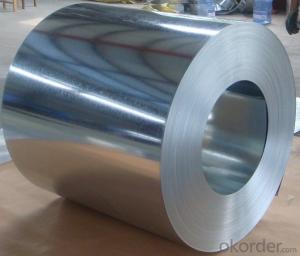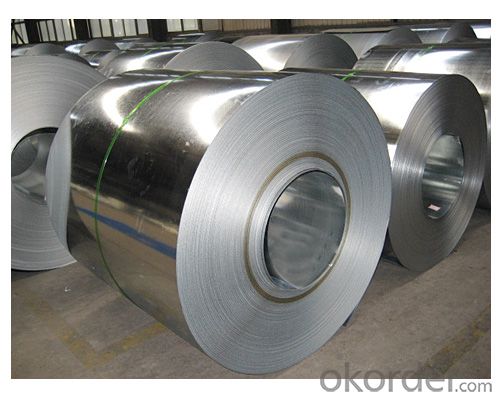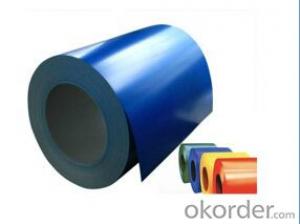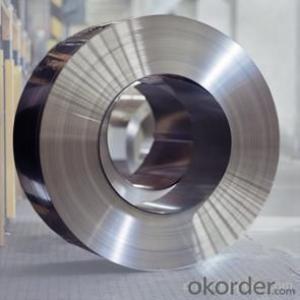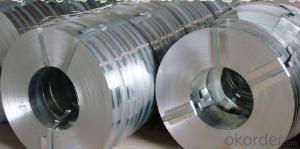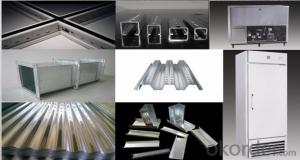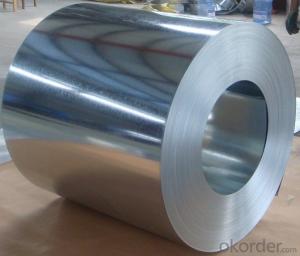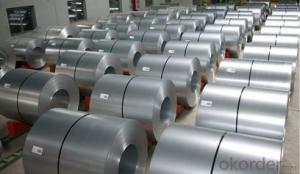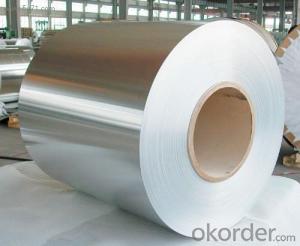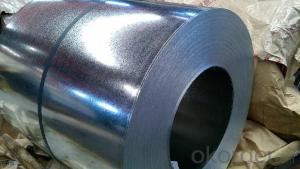Hot-dip Zinc Coating Steel Building Roof Walls -Workability, Durability
- Loading Port:
- China main port
- Payment Terms:
- TT OR LC
- Min Order Qty:
- 50 m.t.
- Supply Capability:
- 10000 m.t./month
OKorder Service Pledge
OKorder Financial Service
You Might Also Like
Hot-dip Zinc Coating Steel Building Roof Walls -Workability, Durability
1.Structure of Hot-Dip Galvanized Steel Sheet Description:
Hot-dip galvanized steel coils are available with a pure zinc coating through the hot-dip galvanizing process. It offers the economy, strength and formability of steel combined with the corrosion resistance of zinc. The hot-dip process is the process by which steel gets coated in layers of zinc to protect against rust. It is especially useful for countless outdoor and industrial applications. Production of cold formed corrugated sheets and profiles for roofing, cladding, decking, tiles, sandwich walls, rainwater protective systems, air conditioning duct as well as electrical appliances and engineering.
2.Main Features of the Hot-Dip Galvanized Steel Sheet:
• Excellent process capability
• Smooth and flat surface
• Workability, durability
• Excellent anticorrosive property
• High strength
3.Hot-Dip Galvanized Steel Sheet Images
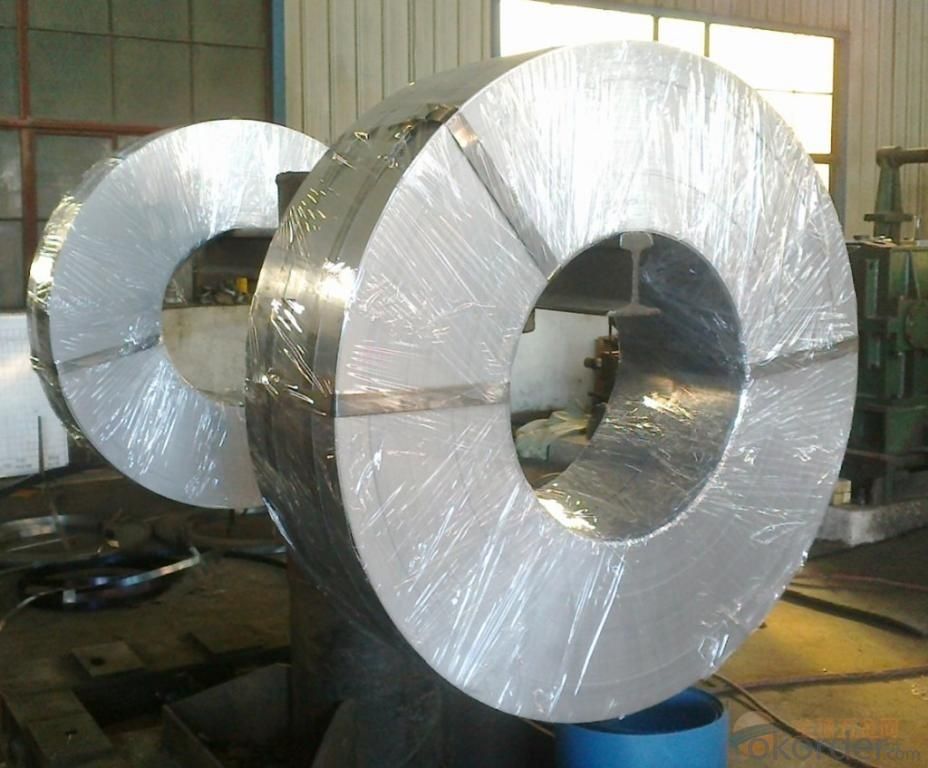
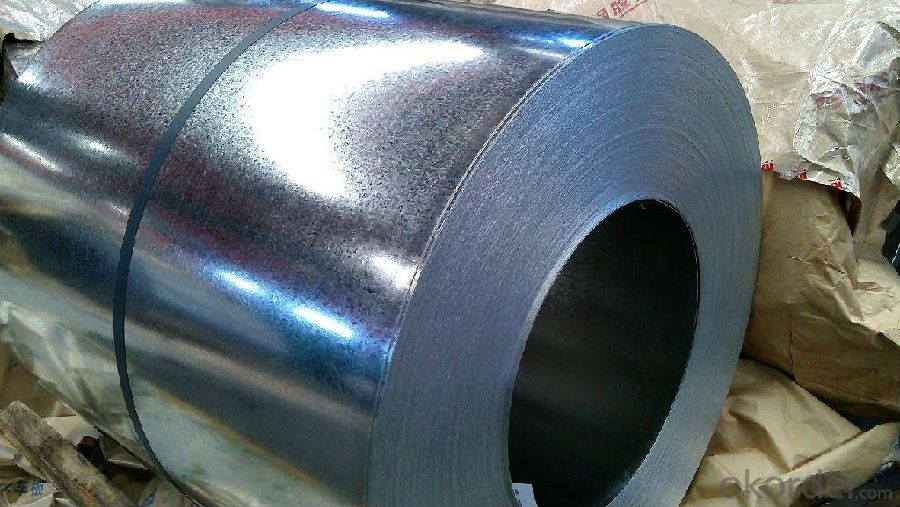
4.Hot-Dip Galvanized Steel Sheet Specification
Standard: ASTM, JIS,EN
Grade: CS, DX51D+Z,SGCC, SS 230~550,S220GD+Z~S550GD+Z, SGC340~SGC570
Thickness: 0.18mm~5mm
Width: max 2000mm
Coil weight:3-12 MT
Coil ID:508/610mm
Surface structure: zero spangle, regular spangle or minimum spangle
Surface treatment: Chromate treatment, Oiled/dry, skinpassed/non-skinpassed
5.FAQ of Hot-Dip Galvanized Steel Sheet
1.How to guarantee the quality of the products?
We have established the international advanced quality management system,every link from raw material to final product we have strict quality test;We resolutely put an end to unqualified products flowing into the market. At the same time, we will provide necessary follow-up service assurance.
2. How long can we receive the product after purchase?
Usually within thirty working days after receiving buyer’s advance payment or LC. We will arrange the factory manufacturing as soon as possible. The cargo readiness usually takes 15-30 days, but the shipment will depend on the vessel situation.
- Q: The highest quality i have seen is 9260 and i want to know if there is a higher quality steel.
- Types of steel are one issue. But the quality of steel no matter what type is even more important. The only way to be sure that you are getting a good blade is to buy from someone that already has a reputation for producing great blades. Stop the questions about who thinks what type of steel is best and investigate the steel blades offered by companies like Bugei Trading company. they have good blades. Opinions vary, but Bugei has proven that they make good swords. That is all that is needed to be known. Any questions you have are best directed to them, not here.
- Q: What are the common coil tests performed for quality control?
- The common coil tests performed for quality control include dimensional checks, visual inspections, mechanical property testing, surface defect examinations, and chemical composition analysis. These tests ensure that the coils meet the required specifications and standards, ensuring their quality and suitability for various applications.
- Q: What are the different types of steel coil cutting methods?
- There are several methods used for cutting steel coils, including shearing, slitting, and laser cutting. Shearing involves using sharp blades to cut through the coil, while slitting utilizes circular blades that make multiple cuts to create narrower strips. Laser cutting, on the other hand, employs a focused laser beam to melt or vaporize the steel, resulting in precise and clean cuts.
- Q: What are the factors affecting the lifespan of steel coils?
- There are several factors that can affect the lifespan of steel coils. Firstly, the quality of the steel used in the manufacturing of the coils plays a significant role. High-quality steel with proper composition and metallurgical properties tends to have a longer lifespan compared to lower-quality steel. Secondly, the environment in which the steel coils are stored and used also affects their lifespan. Exposure to extreme temperatures, humidity, and corrosive substances can lead to degradation and corrosion of the coils, reducing their lifespan. Proper storage conditions, such as controlled temperature and humidity levels, can help prolong the lifespan of the coils. Thirdly, the handling and transportation of steel coils can impact their lifespan. Improper handling, such as dropping or mishandling during loading and unloading, can cause physical damage to the coils, leading to premature failure. Similarly, rough transportation conditions, such as excessive vibration or impact, can also contribute to the deterioration of the coils and reduce their lifespan. Furthermore, the maintenance and care of the steel coils also play a role in their lifespan. Regular inspection, cleaning, and maintenance can help identify and address any potential issues before they become major problems. Additionally, applying protective coatings or treatments to the coils can help prevent corrosion and extend their lifespan. Overall, a combination of factors including the quality of the steel, storage conditions, handling and transportation, and maintenance practices all contribute to the lifespan of steel coils. It is essential to consider these factors and take appropriate measures to ensure the longevity of the coils.
- Q: What are the common methods of protecting steel coils from corrosion?
- There are several common methods used to protect steel coils from corrosion. 1. Coating: One of the most effective methods is to apply a protective coating on the surface of the steel coil. Various types of coatings such as paint, epoxy, or zinc can be used to create a barrier between the steel and the corrosive environment. These coatings provide excellent corrosion resistance and prevent moisture and oxygen from reaching the steel surface. 2. Hot-dip galvanizing: This method involves immersing the steel coil in a bath of molten zinc, which creates a thick layer of zinc coating on the surface. The zinc coating acts as a sacrificial barrier, protecting the steel from corrosion. Hot-dip galvanizing is particularly effective in harsh environments or for long-term outdoor exposure. 3. VCI (Volatile Corrosion Inhibitor) packaging: VCI packaging is a method where steel coils are wrapped in a specially designed film or paper that contains volatile corrosion inhibitors. These inhibitors vaporize and form a protective layer on the surface of the steel, preventing corrosion. VCI packaging is commonly used for short-term storage or transportation of steel coils. 4. Desiccants: Moisture is a major contributor to corrosion. Therefore, using desiccants such as silica gel or activated alumina can help absorb moisture and maintain a dry environment around the steel coils. Desiccants are often used in conjunction with other protective methods to enhance corrosion protection. 5. Proper handling and storage: Proper handling and storage practices can significantly reduce the risk of corrosion. Steel coils should be stored in a dry environment away from moisture sources. They should also be handled with clean gloves to prevent the transfer of corrosive contaminants. Regular inspection and maintenance of the storage area are essential to identify and address any potential corrosion risks. By employing one or a combination of these methods, steel coils can be effectively protected from corrosion, ensuring their durability and integrity.
- Q: help me and my twin love this cutie in our form !? how do we steel hime from bitchey rebecca!? X X X xX
- Well i never had to steel a guy because if I have to go through all of that obviously hes not for me. Also, I never been that desperate. But if you can steel the boy your going to share him with your twin? thats not very... normal. Also if you can steel the guy, how long do you think hes going to stay with you before someone else takes him. Also you should read more so you can spell better because cute guys try to take advantage of dumb girls.
- Q: I have a white gold engagement ring, and to be special I thought I'd get a plain band from Tiffany's--in stainless steel. Can stainless steel be worn with white gold or will there be a difference in the color or texture? I'm not planning on getting them soldered together, but I don't want it to be noticeable that they are different metals. Does anyone have experience in this subject?
- I didn't know Tiffany's sold stainless steel rings. I think the colour might match, but the texture wouldn't really (from looking at all the stainless steel around my kitchen. The only way to know for sure is to go to Tiffany's and try it on with your ring. Why not consider a white gold band from Tiffany's? I don't know what the price difference would be on that. But you can get a white gold for around $250 from TCo.
- Q: What are the common problems faced during steel coil production?
- During the production of steel coils, several common issues may arise. One of the most frequently encountered problems is the breakage or damage of the coils. This can happen as a result of improper handling or transportation, leading to cracks or fractures. To minimize the risk of coil breakage, it is crucial to adhere to proper handling procedures. Another issue that often arises is coil slippage. This occurs when the coils are not securely stacked or stored, causing them to shift or slide. Coil slippage can cause damage to the coils and potentially lead to accidents or injuries. Therefore, it is essential to have adequate storage systems in place to prevent such slippage. Furthermore, corrosion is a prevalent problem in steel coil production. Corrosion can be caused by exposure to moisture, air, or other corrosive substances. It can result in the deterioration of the steel, reducing its strength and durability. To address this issue, it is necessary to implement effective corrosion prevention measures, such as proper coating or storage techniques. Coil quality issues are another challenge faced in steel coil production. These problems can include inconsistencies in thickness, width, or surface defects on the coils. Various factors, such as improper rolling processes, equipment malfunctions, or material defects, can contribute to these quality problems. Regular quality checks and inspections should be carried out to promptly identify and resolve any issues. Moreover, problems related to coil handling and loading may also arise during steel coil production. Improper lifting or loading techniques can lead to coil damage, resulting in deformations or even accidents. Proper training and education of employees on appropriate handling and loading procedures are crucial to prevent such problems. In conclusion, steel coil production can encounter various challenges, ranging from coil breakage and slippage to corrosion and quality issues. Implementing proper handling, storage, and quality control measures is indispensable in minimizing these problems and ensuring the production of high-quality steel coils.
- Q: every time i look for steel over the internet like to build cars motorcycles ect i only get steel pipes where can i get steel sheets
- This okorder /... Most towns have a steel supply house/ business, check your yellow pages. Also check with local welding and machine shops. They can give you ideas and or their suppliers. They often have bits and pieces that you might buy, instead of ordering a full sheet of material. Wingman
- Q: Can steel coils be coated with magnetic materials?
- Yes, steel coils can be coated with magnetic materials.
Send your message to us
Hot-dip Zinc Coating Steel Building Roof Walls -Workability, Durability
- Loading Port:
- China main port
- Payment Terms:
- TT OR LC
- Min Order Qty:
- 50 m.t.
- Supply Capability:
- 10000 m.t./month
OKorder Service Pledge
OKorder Financial Service
Similar products
Hot products
Hot Searches
Related keywords
